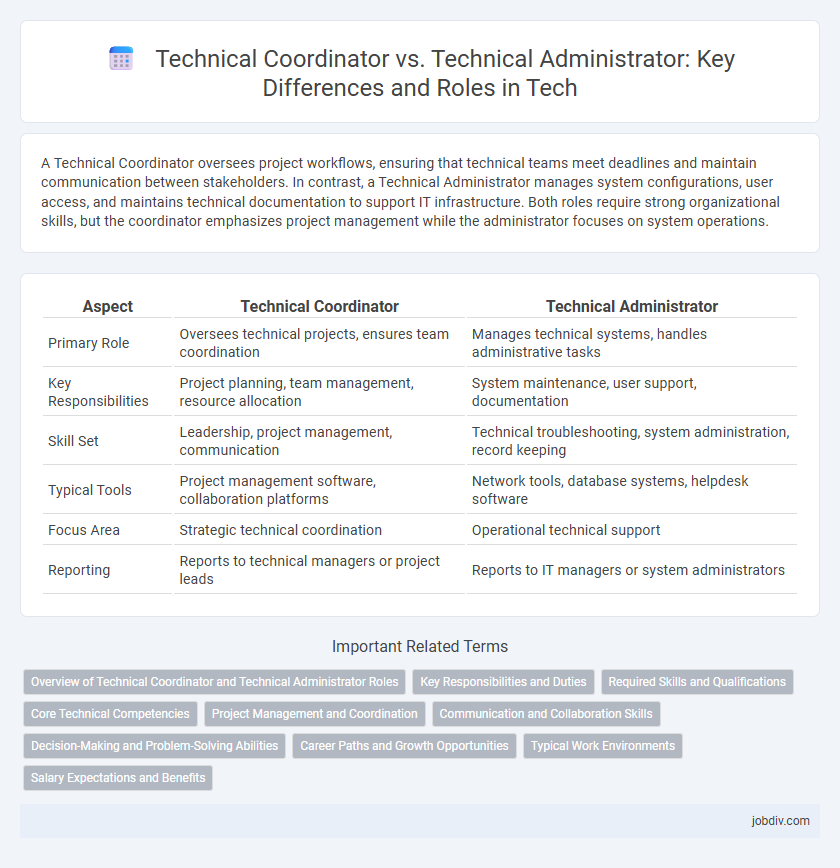A Technical Coordinator oversees project workflows, ensuring that technical teams meet deadlines and maintain communication between stakeholders. In contrast, a Technical Administrator manages system configurations, user access, and maintains technical documentation to support IT infrastructure. Both roles require strong organizational skills, but the coordinator emphasizes project management while the administrator focuses on system operations.
Table of Comparison
| Aspect | Technical Coordinator | Technical Administrator |
|---|---|---|
| Primary Role | Oversees technical projects, ensures team coordination | Manages technical systems, handles administrative tasks |
| Key Responsibilities | Project planning, team management, resource allocation | System maintenance, user support, documentation |
| Skill Set | Leadership, project management, communication | Technical troubleshooting, system administration, record keeping |
| Typical Tools | Project management software, collaboration platforms | Network tools, database systems, helpdesk software |
| Focus Area | Strategic technical coordination | Operational technical support |
| Reporting | Reports to technical managers or project leads | Reports to IT managers or system administrators |
Overview of Technical Coordinator and Technical Administrator Roles
Technical Coordinators manage project timelines, coordinate team activities, and ensure smooth communication between technical teams and stakeholders, focusing on workflow optimization and resource allocation. Technical Administrators specialize in system configuration, maintenance, and user support, emphasizing infrastructure management and technical troubleshooting. Both roles are critical for operational efficiency but differ in scope, with coordinators overseeing project execution and administrators handling system functionality.
Key Responsibilities and Duties
Technical Coordinators oversee project timelines, resource allocation, and cross-department communication to ensure technical objectives are met efficiently. Technical Administrators manage system configurations, user access controls, and maintenance schedules to maintain infrastructure stability and security. Both roles require strong problem-solving skills, but coordinators emphasize organizational leadership while administrators focus on technical system management.
Required Skills and Qualifications
Technical Coordinators require strong project management skills, proficiency in communication, and expertise in coordinating technical teams and resources to ensure project milestones are met. Technical Administrators must possess in-depth knowledge of system administration, network management, and troubleshooting, along with certifications such as CompTIA Network+ or Microsoft Certified Solutions Expert (MCSE). Both roles demand problem-solving abilities and a solid understanding of IT infrastructure, but Technical Coordinators emphasize leadership and coordination, while Technical Administrators focus on technical system maintenance and support.
Core Technical Competencies
Technical Coordinators excel in project management, cross-functional collaboration, and technical workflow optimization, ensuring seamless integration of engineering teams and resource allocation. Technical Administrators focus on system maintenance, network security, and technical support, ensuring operational stability and efficient infrastructure management. Both roles require proficiency in software tools, troubleshooting skills, and understanding of IT frameworks, but Coordinators prioritize strategic planning while Administrators emphasize day-to-day technical execution.
Project Management and Coordination
Technical Coordinators oversee project workflows, ensuring cross-functional teams meet milestones by managing schedules, resources, and communication channels. Technical Administrators focus on system maintenance and support, handling software configurations, documentation, and troubleshooting essential for uninterrupted project execution. Effective project management requires Technical Coordinators to align objectives and Technical Administrators to maintain the technical infrastructure supporting those objectives.
Communication and Collaboration Skills
Technical Coordinators excel in communication and collaboration, acting as vital liaisons between technical teams and project stakeholders to ensure seamless information flow and alignment of objectives. Technical Administrators prioritize internal coordination within IT infrastructure teams, managing system updates and troubleshooting with a focus on operational efficiency rather than external stakeholder interaction. Both roles require strong interpersonal skills, but Technical Coordinators engage more extensively in cross-functional collaboration and stakeholder communication.
Decision-Making and Problem-Solving Abilities
Technical Coordinators excel in strategic decision-making, overseeing project workflows and aligning technical tasks with organizational goals to optimize resource allocation and timelines. Technical Administrators specialize in tactical problem-solving by managing system configurations, maintaining infrastructure stability, and resolving operational issues promptly to ensure seamless technology performance. Both roles require strong analytical skills, but Coordinators focus on high-level planning decisions while Administrators handle immediate technical challenges.
Career Paths and Growth Opportunities
Technical Coordinators often progress into project management or specialized technical roles by leveraging their skills in team coordination, resource allocation, and communication. Technical Administrators typically advance towards system architecture, IT management, or cybersecurity roles, capitalizing on their expertise in system maintenance, network administration, and technical support. Both career paths offer growth opportunities, with Technical Coordinators focusing on leadership and project execution, while Technical Administrators emphasize technical proficiency and infrastructure management.
Typical Work Environments
Technical Coordinators typically operate in dynamic project-based environments such as IT firms, construction sites, and media production companies, managing team workflows and ensuring technical resources align with project goals. Technical Administrators are more often found in structured office settings within organizations like corporate IT departments, universities, and government agencies, where they focus on maintaining technical infrastructure and supporting system operations. Both roles require collaboration across departments but differ in the intensity of project coordination versus system management.
Salary Expectations and Benefits
Technical Coordinators typically command higher salary expectations than Technical Administrators due to their expanded project management responsibilities and strategic oversight in technology deployment. Benefits for Technical Coordinators often include performance bonuses and professional development funds, reflecting their leadership roles, while Technical Administrators usually receive standard health coverage and retirement plans. Salary averages for Technical Coordinators range from $70,000 to $95,000 annually, whereas Technical Administrators earn between $50,000 and $70,000, influenced by industry and geographic location.
Technical Coordinator vs Technical Administrator Infographic

 jobdiv.com
jobdiv.com